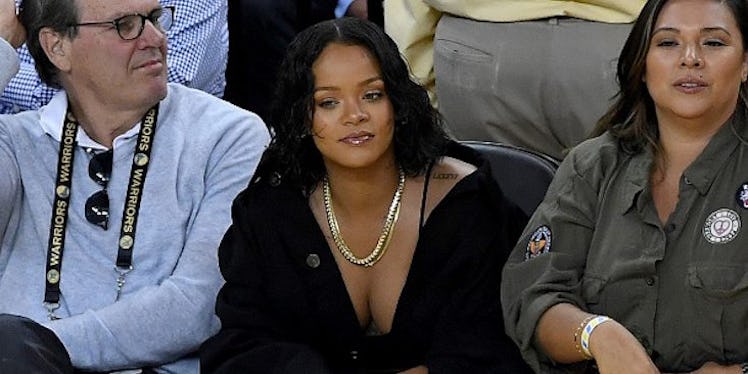
People Are Saying Rihanna Got "Thick," But Can We Stop Policing Women's Bodies?
Rihanna is everything and the entire internet knows it.
We obsess over her when she sits front row at basketball games, imagine new dating options for her, and turn all of her twerking moments into GIFs. You know, as we should.
And be honest, did we ever really recover from her undefeated slay at the 2017 Met Gala?
That Rihanna reign just won't stop and it's not like we ever want it to. Many of us (OK, maybe just the girls on Twitter) would even let her borrow our boyfriends for the night — so long as he makes us proud and pleases Rihanna as she so rightfully deserves.
We are entirely unashamed.
But we need to draw the line at her weight gain. Since Rihanna's thicker thighs hit the streets, it's all the internet can talk about.
Some people are praising her for being "thicker than a snicker."
Others seem worried that she'll teeter too close to "fat."
And then there are the people who are speculating a pregnancy.
All of it is too much. Can we let Rihanna and her thighs live?
Turning a woman's size into the topic of national conversation and then delving into whether or not she's pregnant, has a good sex life, or has been eating well, is incredibly invasive. Hoping that Rihanna remains in the "thick" category and avoids becoming "fat" is cruel to her and other plus-size women.
In that desire lies the need for women to achieve a very specific body type without falling too far below or beneath; it all but screams "fat phobia."
Let's stop our practice of policing women's bodies altogether.
Our obsession with bodies and size has had a direct affect on our culture.
For clarity, positive talk about curvy women is not bad. Mainstream beauty standards would have us all only focusing on smaller women who do not even represent the average woman's body size — which is 16 to 18, according to a study in the International Journal of Fashion Design, Technology, and Education.
"Skinny privilege" exists, and gives women of smaller sizes an advantage over larger women. Experiences like always being able to find clothing in your size, always being able to see your body type reflected in the media, and never having to endure a fat joke are all things that skinny privilege affords certain people in our society. It's real and it's wrong.
Still, in many communities of color (particularly the black and Hispanic population), having more curves is the standard of beauty and being skinny is less desirable. Since art imitates life, turn to some of the most popular songs in hip-hop's past and present for reference.
From Sir Mix-a-Lot's 1992 "Baby Got Back" anthem to Big Sean's 2011 "Dance (A$$)" record to the Migos' 2017 "All Ass" bop, being a "thick" woman is celebrated.
This obsession with the hourglass shape, particularly the derriere, has seemingly contributed to the popularity of body augmentation culture.
Celebrities such as Nicki Minaj, Kim Kardashian, Khloe Kardashian, Blac Chyna, and Cardi B are constantly surrounded by rumors that they underwent some type of body augmentation surgery. Out of the women listed, only rapper Cardi B has admitted to breast implants and butt injections.
Non-famous women have also jumped on the trend and a few of the surgeries have been fatal. Some have even lost limbs due to infections from botched jobs.
Neither side of the body type conversation truly empowers women.
Pressuring women to be smaller or thicker, and then obsessing over either, perpetuates the idea that a woman's value lies in her body and little else.
These unrealistic body expectations, whether they come from a place of praise or ridicule, often result in these excessive and insulting conversations about women's personal lives —and for some women clamoring to achieve the looks by any means necessary.
We need to dead all of it and just let Rihanna and all women live — thick or not — in peace.